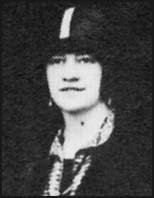Vera Terrington

Vera Bousher was born in 1889. She married Guy Sebright but he died in 1912 and six years later married Harold Woodhouse. He became the 2nd Lord Terrington on the death of his father, James Woodhouse, on 8th February, 1921.
A member of the Liberal Party, Terrington unsuccessfully contested Wycombe in 1922. The following year Terrington was interviewed by Charlotte Haldane. In the article that appeared in the Daily Express Terrington was quoted as saying: "If I am elected to Westminster I intend to wear my best clothes. I shall put on my ospreys and my fur coat and my pearls. Everyone here knows I live in a large house and keep men servants, and can afford a motor-car and a fur coat. Every woman would do the same if she could. It is sheer hypocrisy to pretend in public life that you have no nice things and not to display them in your home."
Terrington took objection to the way the story was presented in the newspaper. She particularly disliked the headline 'Aim If Elected - Furs and Pearls'. The Daily Express was sued by Terrington, who claimed that the article written by Charlotte made her look "vain, frivolous, and an extravagant woman". The judge ruled that Lady Terrington had not suffered "a farthings worth of damage" and lost her case.
In December 1923 Terrington was elected to the House of Commons as representative for Wycombe. She supported the abolition of the means test for old-age pensions, and supported moves to give parents equal rights to custody. She also campaigned against cruelty to animals. However, she was defeated in the General Election of 1924 by the Conservative Party candidate, Alfred Knox, an the former ritish Military Attaché in Petrograd.
Vera divorced Lord Terrington in 1927 and married Max Lensvelt of South Africa in 1949.
Primary Sources
(1) Jack Anderson, Confessions of a Muckraker (1979)
The motivation behind most of his (Drew Pearson) crusades was his Quaker pacifism and a conviction that peoples must reach out, over governmental barriers, to aid and communicate with one another lest the horrors of the past be repeated.
In the late 1930s he had put aside his Quaker principles because of the overriding peril he saw in totalitarian aggression, and he effectively supported the Roosevelt interventionist policies and the war effort. But at war's end he became plagued with alarming visions - an America permanently militarized, the sweep of Stalinism into Western Europe, a world divided by backward-looking politicians into hostile East-West camps. He had emerged from the war years as the single most influential commentator in the world, and he determined to use that influence...
